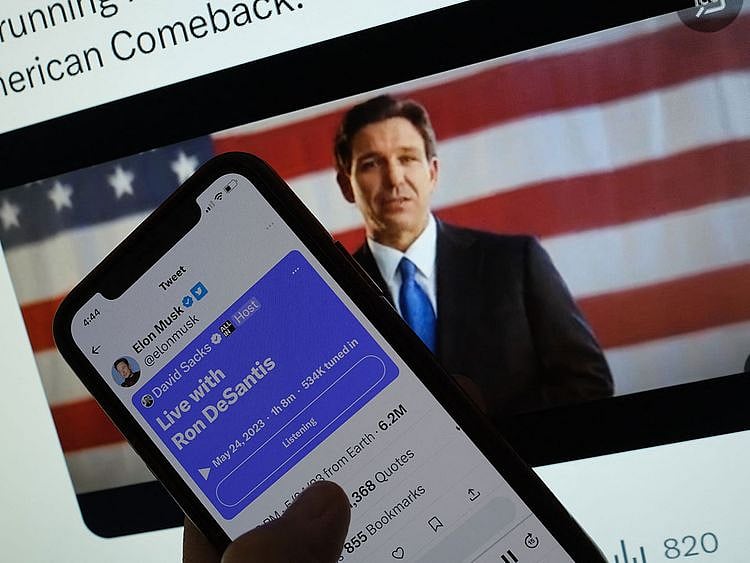Ron DeSantis’ presidential campaign kickoff glitches out
Analysing the fallout from DeSantis’ much hyped campaign launch that went awry

Maybe Ron DeSantis should try turning his campaign off and on again.
The Republican Florida governor, trying to kick off a presidential run via a Twitter Spaces interview with Elon Musk, encountered an error message. “Preparing to launch ...” the audio platform informed would-be listeners.
What followed was several minutes of silence; what followed that was hot-mic background chatter about the apparent malfunction; what followed that was a series of excuses. The popularity of the event, investor and co-host David Sacks said, was “melting the servers” and “broke the internet.”
Eventually, even DeSantis dropped out of the chat. He and his humbled hosts reappeared a little later on a new account, but the digital audience was whittled down to a quarter or so of its original size — about 150,000 of an initial 600,000, before it grew again to 300,000.
Nonetheless, Sacks declared that this was “probably the biggest room that has ever been assembled online.” How’s that for Trumpism without Trump?
Also Read
2024 US presidential election: Who's in, who's out and who is still thinking about itUS presidential election: DeSantis files papers to enter 2024 White House raceUS presidential election: Ron DeSantis White House launch plagued by Twitter meltdownRapper Travis Scott drew 12.3 million virtual concertgoers to his pandemic-era performance on the video game “Fortnite.” Among politicians, Rep. Alexandria Ocasio-Cortez (D-N. Y.) attracted 400,000 fans to an impromptu Twitch stream of her playing the cartoon space-themed party game “Among Us.” Even a watermelon attracted more viewers (800,000) back in 2016 when BuzzFeed blew it up with rubber bands on Facebook.
What matters to American voters
And, of course, none of these events really said anything about what matters to American voters.
But DeSantis doesn’t understand this, or else he wouldn’t have led himself into thinking that launching a campaign on today’s culture-war-ridden Twitter was a shrewd political play — that the extremely online far right, constantly in conspiratorial conversation with itself, would prove a potent force in a Republican primary already crowded by Donald Trump.
You could hear this conviction, too, in the extended interview that DeSantis gave post-fiasco. Woke, woke, woke — literally, three times in five seconds. This guy hates the mainstream media.
He hates all this gender brainwashing! He hates the elite cabal, big corporations and local government officials colluding to do whatever bad thing it is the cabal is doing. It is absolutely not the economy, stupid. It’s not inflation, or crime, or the nation’s waning influence around the globe.
Who on earth was DeSantis talking to? The better question is, who online was he talking to? His chosen audience, apparently, was meme-minded dwellers of the fever swamps. The event focused less on what his candidacy meant for America than on how cool it was that the campaign was launching on Twitter Spaces, as no campaign for so consequential an election had before, and how important it was that Musk had purchased Twitter.
Perhaps the most tone-deaf moment in an evening full of them was the release by the DeSantis war room of a bizarre web video featuring a disproportionate amount of footage of Musk, one of the richest men in the world, whose brand was built in notoriously liberal Silicon Valley.
An alliance between him and an aspiring GOP nominee can’t possibly make sense to your typical conservative — whether of the traditional mold or the new populist variety. It makes sense only to red-pilled tech guys like Musk.
DeSantis and Musk, put simply, are betting on each other. DeSantis needs to create his own version of the Fox News audience that so loves his rival. Musk wants to turn his platform into his own version of Fox News — one relevant enough that an Oval Office aspirant would pick it for his campaign pulpit. Yet on Wednesday night, they both lost.
The trouble is, the internet is not America, and its fever-swampiest residents aren’t the Republican Party. Worse for DeSantis, relying on the internet to win over America is particularly risky for a right-winger. Cosying up to tech is tough for conservatives, because when tech works well, it does a lot of stuff they don’t like — such as removing hate and harassment, or fighting misinformation.
Wednesday’s launch event was a literal echo chamber, the participants’ voices accidentally duplicated so that it sounded as if they were talking over themselves and to themselves at the same time — perfectly summing up political discourse on Twitter today.
Washington Post
Molly Roberts is an award winning visuals editor and columnist
Sign up for the Daily Briefing
Get the latest news and updates straight to your inbox
Network Links
GN StoreDownload our app
© Al Nisr Publishing LLC 2026. All rights reserved.